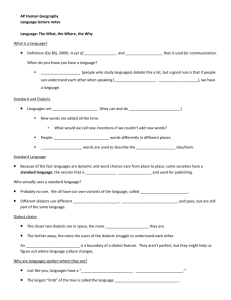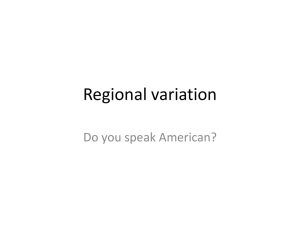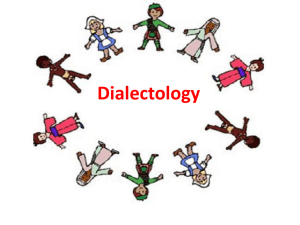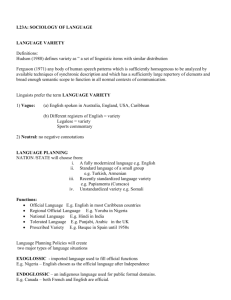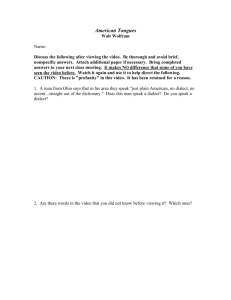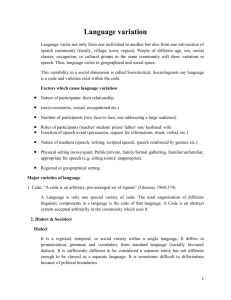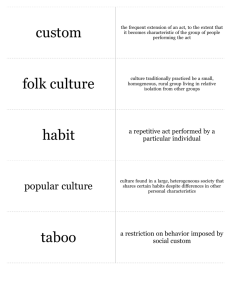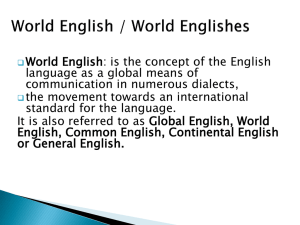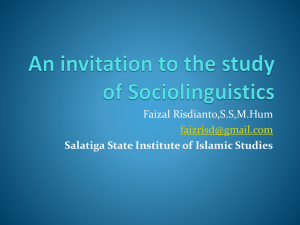Pre-quiz work-out questions - University of Toronto Mississauga
advertisement
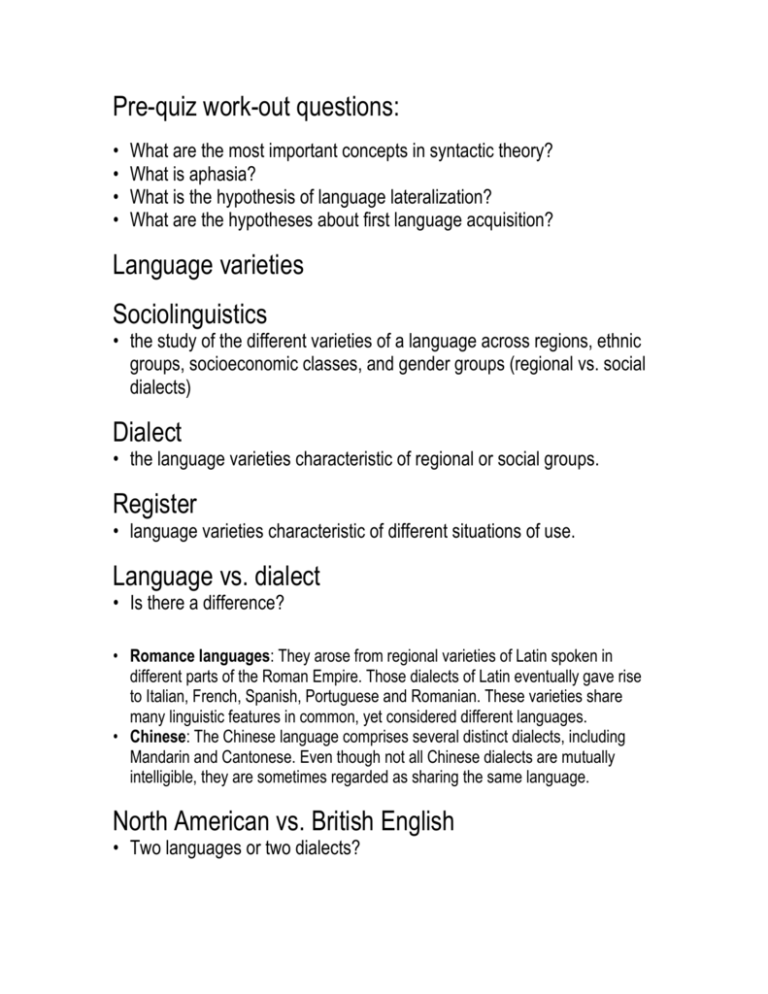
Pre-quiz work-out questions: • • • • What are the most important concepts in syntactic theory? What is aphasia? What is the hypothesis of language lateralization? What are the hypotheses about first language acquisition? Language varieties Sociolinguistics • the study of the different varieties of a language across regions, ethnic groups, socioeconomic classes, and gender groups (regional vs. social dialects) Dialect • the language varieties characteristic of regional or social groups. Register • language varieties characteristic of different situations of use. Language vs. dialect • Is there a difference? • Romance languages: They arose from regional varieties of Latin spoken in different parts of the Roman Empire. Those dialects of Latin eventually gave rise to Italian, French, Spanish, Portuguese and Romanian. These varieties share many linguistic features in common, yet considered different languages. • Chinese: The Chinese language comprises several distinct dialects, including Mandarin and Cantonese. Even though not all Chinese dialects are mutually intelligible, they are sometimes regarded as sharing the same language. North American vs. British English • Two languages or two dialects? • British English is the basis for the varieties spoken in England, Ireland, Wales, Scotland, Australia, New Zealand, India, Pakistan, Malaysia, Singapore, and South Africa. • North American includes chiefly the English of Canada and the US. • Spelling differences: US Brit color colour tire tyre theater theatre Which ones are adopted by Canadians? • Morphological and syntactic differences: US Brit in the hospital, to the university, the next day in hospital to university next day You have a brother, don’t you? You have a brother, haven’t you? Which ones are adopted by Canadians? • Words: US elevator second floor TV hood(of a car) trunk cookies gas truck can line underwear Brit lift first floor telly bonnet boot biscuits petrol lorry tin queue knickers Which ones are adopted by Canadians? Accent vs. Dialect • Difference? • Accent: pronunciation • Dialect: pronunciation, vocabulary and grammar Norm vs. Dialect • Norm = the dialect most socially successful, originally connected with a political or cultural center (London for British English, Paris for Standard French) Pidgin vs. creole • Pidgin = a variety of a language developed for practical purposes (trading) among people who had a lot of contact but did not know each other’s language • Creole = a pidgin who becomes the first language of a social community Le pidgin de Hawaii An den? and then? So? Any kine: any kind. Ass right: that's right. Bo da dem: both of them. Braddah: brother. Brah: friend, buddy. Brok da mout: tastes delicious. Grind: eat. Grinds: food. How you figga? what do you think? Howzit? how are you doing? K den: OK, agreed. Lolo: dummy, stupid. Mo bettah: much better. No can: cannot, not possible. Ono: tasty. Onoliscious: very tasty, delicious! Pau hana: finished work for the day. Slippah: thongs, slippers. Stink eye: mean or dirty look. Talk stink: speaking badly about someone. Talk story: rap; chew the fat, chat. Tanks: thanks. To da max: all the way; most you can get. Creoles • Caribbean Creoles: • Papiamento = a mixture of Spanish, Portuguese, Dutch, English, French, and it also has some Arawak Indian and African influences. Papiamentu is one of the few Creole Languages of the Caribbean that has survived to the present day. Papiamentu is predominately a spoken language among the local people of Curaçao, Bonaire, and Aruba. The official language is Dutch, and the written Papiamentu is limited to some local newspapers and literature. Also the schooling system is Dutch, and people typically don't get any formal training in their language. There have been some discussions about introducing Papiamentu to be taught at schools as well. http://www.narin.com/papiamentu/ • Kreyol = is primarily spoken in the Caribbean on the western part of the island of Hispaniola, i.e., Haiti, and has the largest number of speakers of all the Caribbean creoles, around 6 million. The language is derived from French, but has also many words borrowed from African languages. http://www.verbix.com/languages/kreyol.shtml • Martinique Creole = spoken on the Martinique Island; on the basis of French vocabulary Portuguese based Creole in south Asia • What are the main languages spoken in Canada? Are they languages or dialects? Next week: read pages 226-238
